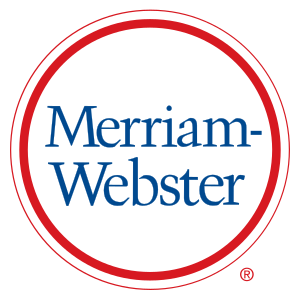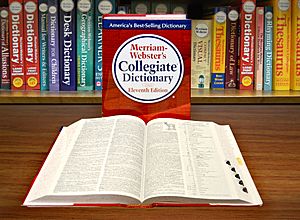Merriam-Webster facts for kids
 |
|
| Parent company | Encyclopædia Britannica, Inc. |
|---|---|
| Founded | 1831 |
| Founder | George Merriam, Charles Merriam |
| Country of origin | United States |
| Headquarters location | 47 Federal Street, Springfield, Massachusetts, U.S. |
| Publication types | Reference books, online dictionaries |
| Owner(s) | Encyclopædia Britannica, Inc. |
Merriam-Webster, Incorporated is a famous American company. It publishes many reference books. The company is best known for its dictionaries. It is the oldest dictionary publisher in the United States.
In 1831, brothers George Merriam and Charles Merriam started the company. They called it G & C Merriam Co. It was located in Springfield, Massachusetts.
After Noah Webster passed away in 1843, the company bought the rights to his famous book. This book was called An American Dictionary of the English Language. All Merriam-Webster dictionaries today come from this original work.
In 1964, Encyclopædia Britannica, Inc. bought Merriam-Webster, Inc. It became a part of their company. In 1982, the company changed its name to Merriam-Webster, Incorporated.
Contents
History of Merriam-Webster Dictionaries
How Noah Webster Started It All
In 1806, Noah Webster published his first dictionary. It was called A Compendious Dictionary of the English Language. The next year, in 1807, Webster began a huge project. He wanted to make a much bigger dictionary.
This big project was called An American Dictionary of the English Language. To find out where words came from, Webster learned 26 different languages. He wanted to make American English more standard. People in different parts of the United States used words differently. They also spelled, said, and used words in various ways.
In 1825, Webster finished his dictionary while in Europe. It had 70,000 words. About 12,000 of these words had never been in a dictionary before. Webster also wanted to make English spelling simpler. He changed spellings like colour to color and centre to center. He also added American words like skunk and squash. These words were not in British dictionaries.
Webster published his dictionary in 1828 when he was 70 years old. At first, it did not sell well. Only 2,500 copies were sold, and he ended up in debt. However, in 1840, he released a second edition. This one was much more successful.
Merriam Brothers Take Over
In 1843, after Noah Webster died, George and Charles Merriam bought the rights to his 1840 dictionary. Four years later, in 1847, they published a new version. It added new sections but did not change the main text. In 1859, they released another update with pictures.
In 1864, Merriam published a much larger edition. This was the first time Webster's original text was changed. They updated much of his work but kept many of his definitions. The title remained An American Dictionary. By 1884, this dictionary had 118,000 words. This was 3,000 more words than any other English dictionary at the time.
In 1890, they published a new dictionary. They renamed it Webster's International. The number of words grew even more in later editions. Webster's New International editions came out in 1909 and 1934. These had over half a million words. The 1934 edition is now called Webster's Second International.
The Collegiate Dictionary was first introduced in 1898. It is now in its eleventh edition. Two Collegiate editions were made as shorter versions of the larger Unabridged dictionaries.
Merriam-Webster in the 20th Century
Since the 1940s, the company has created many special dictionaries. They also made language guides and other reference books. In 1961, Merriam updated the dictionary again. They published Webster's Third New International. Philip B. Gove edited this version. His changes caused some public discussion.
Many changes were about how the dictionary looked. They removed extra punctuation and used phrases instead of full sentences. Other changes were more debated. They showed a shift towards describing how American English was actually used. This was different from telling people how they should use it.
In 1964, the company became part of Encyclopædia Britannica, Inc..
In 1983, the ninth edition of the Collegiate dictionary came out. It was called Webster's Ninth New Collegiate Dictionary (WNNCD). This edition made changes that made it different from just a shorter version of the Third New International. The main text of the Third New International had not changed much since 1961.
Some proper names were put back into the word list. This included names of Knights of the Round Table. The most important change was adding the date when each word was first known to be used. This showed when words entered the English language.
Also in 1983, the company changed its name to Merriam-Webster, Incorporated. This happened after they lost the right to be the only ones using the name Webster. Before this, their books often had "A Merriam-Webster Dictionary" as a subtitle.
Merriam-Webster in the 21st Century
In 2003, the eleventh edition of the Collegiate dictionary was published. It had over 225,000 definitions and more than 165,000 entries. Sometimes, a CD-ROM of the text was included. This dictionary is a top choice for spelling by The Chicago Manual of Style. Many U.S. book publishers and magazines follow this guide. The Chicago Manual usually picks the first spelling listed in the dictionary.
Merriam-Webster also uses social media a lot. They often post interesting facts about words.
Merriam-Webster Services
In 1996, Merriam-Webster launched its first website. This website offered free access to an online dictionary and thesaurus.
Merriam-Webster has also published many other types of dictionaries. These include dictionaries of synonyms, English usage, and geography (in its Merriam-Webster's Geographical Dictionary). They also have books on biography, proper names, medical terms, sports terms, slang, and Spanish/English.
Other books they publish include Collegiate Thesaurus and Secretarial Handbook. They also have Manual for Writers and Editors, Collegiate Encyclopedia, Encyclopedia of Literature, and Encyclopedia of World Religions.
On February 16, 2007, Merriam-Webster started a mobile dictionary and thesaurus service. People could use this service to get definitions, spellings, and synonyms by text message. Other services include Merriam-Webster's Word of the Day. They also have Open Dictionary, which is a wiki service. This lets people create and share their own new words and definitions.
How Words Are Pronounced
The Merriam-Webster company used special symbols in their dictionaries. These symbols helped people from different parts of the United States learn how to say words. The goal was for people with the same accent to pronounce words similarly.
Unicode is a system for computer text. It added symbols from the IPA in 1993. But it did not support Merriam-Webster's special phonetic symbols until 2003. So, for their online services, Merriam-Webster uses simpler ASCII characters to show how words are pronounced. This makes it easier for computers to use the information.
How Dictionary Entries Are Made
Merriam-Webster creates dictionary entries by finding how words are used. They look for words in books, newspapers, and even ads. They record these uses in a huge database called a citation file.
Editors at Merriam-Webster spend about an hour each day looking at printed materials. They study how individual words are used. They choose examples that should be saved in the citation file. This file has over 16 million entries. These entries show how words have been used over time.
Millions of these examples were once written on 3-by-5 cards. These paper files go back to the late 1800s. Since 2009, all new entries are saved in a computer database.
See also
 In Spanish: Merriam-Webster para niños
In Spanish: Merriam-Webster para niños
- Lists of Merriam-Webster's Words of the Year
- Quordle, an online word game owned by the company launched in 2022
- Kory Stamper, lexicographer, editor, and social media personality at Merriam-Webster
- Webster's Dictionary
- Webster's Third New International Dictionary
- Word War 5, a word game collection co-distributed by the company launched in 1995
 | James Van Der Zee |
 | Alma Thomas |
 | Ellis Wilson |
 | Margaret Taylor-Burroughs |


